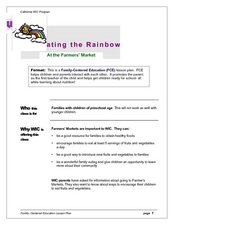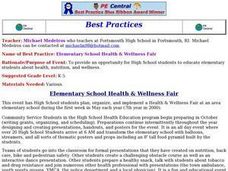ResourcesWeb & Docs
MediaVideo & Audio
CollectionsLessons & Topics
AI Teacher ToolsInstruction & Ideas
newFilter
1,001 results:
organic eatingClear All
Curated OER
Funky Fungus
Students discuss decomposition, bacteria, fungi and other microscopic organisms. They participate in an experiment to grow fungus on bread. As the fungus colonies grow, students observe them under a microscope to identify and locate...
Curated OER
It's Time to Get Organ-Wised
Students engage in a activity which contains several ideas for a unit on the body and body organs. They solve riddles, color in shapes of organs, participate in games and read about the functions of the various organs. Worksheets are...
Curated OER
Eating the Rainbow: At the Farmer's Market
Students share what type of fruit and vegetables they like. For this adult health lesson, students explain the benefits of eating healthy foods. They discuss recipe ideas that can be done at home.
Florida Department of Health
Nutrition: Developing Healthy Habits Unit
The focus of the fourth unit in the Youth Risk Behavior Survey Curriculum is on healthy eating and exercise. Class members examine healthy habits data from the YRBD Youth Online Tool, learn about the importance of a healthy diet and...
Curated OER
Nutrition -- A Lesson for Life - Biology Teaching Thesis
Students briefly explain the importance of nutrition in their everyday lives, and they tell you about how many calories they should consume in a day. They list readily available and affordable healthy foods that they LIKE to eat....
American Museum of Natural History
What's This? Feeding
Some species have pretty creative methods for catching food. Young scientists learn about some interesting ways organisms get the nutrients they need by navigating an online interactive lesson that would be suitable for a remote learning...
Nuffield Foundation
Microbes Ate My Homework
Now you have a new excuse not to do your homework. A long-term experiment has learners explore cellulose-digesting enzymes. They simulate how paper breaks down in a compost bin. There's no need to blame your dog for eating your homework...
Curated OER
English Exercises: Fast Food Goes Organic
In this vocabulary and listening skills online activity, students complete a crossword puzzle with the names of fast foods that are shown in clip art pictures. They watch a YouTube video about a fast food restaurant becoming organic....
Curated OER
What Happens When You Eat?
Students explore digestion. For this Human Body lesson plan, students participate in six different activities pertaining to the Digestive System. Students gain understanding of digestion through experimentation and investigation....
Curated OER
Read It, Don't Eat It!
Students complete activities based on the book Read It, Don't Eat It! In this library rules lesson, students are read a story that illustrates library rules, then match the rules with pictures and complete a maze.
Curated OER
Green Genes: Genetically Modified Organisms in Our Food
Students investigate how and why genetically modified organisms are used as food crops. They identify the advantages and disadvantages of these crops through internet research then present their views and discuss them as a large group.
Curated OER
Teeth and Eating
Students examine pictures of different animals and decide if they eat meat and/or plants. They inspect models of pairs of upper and lower teeth and discuss which teeth are most useful for cutting grass and tearing meat.
Curated OER
The Lynx Eats The Hare
Students investigate the predator and prey relationship. This is done using a simple simulation. The simulation is done as an arts and craft activity. Students record data and track it using a graphic organizer and then they discuss the...
Curated OER
Introduction to Organisms of the St. Mary's River
Students identify how the tank functions, what organisms are in the tank, and why each component of the tank is important. They are introduced to the organism eelgrass. Students explore the organism Fundulus.
Biology Junction
Energy Flow Through an Ecosystem: Food Chains, Food Webs, and Energy Pyramids
When a minnow eats a piece of plastic, that garbage often tracks through multiple animals, causing harm to each as it passes through the food chain. Scholars learn about food chains, food webs, and energy pyramids with a presentation. It...
University of Kentucky
Beneficial Bug Scavenger Hunt
Many people think of bugs as annoying pests to be squashed, but most insects and spiders are beneficial, eating the actual pests or pollinating plants. After reviewing some of the common bugs in your area (they may differ from those...
Polar Trec
Bering Sea Fabulous Food Chain Game
In spring, the Bering Sea turns green due to phytoplankton, which live at the surface, experiencing a population explosion. Groups of scholars play a food chain game, writing down food chains as the game is played. After five to six...
Science Friday
Termite Symbiosis
What happens to the wood a termite eats? Pupils learn about the three types of symbiosis with pictures of symbiotic pairs. Afterward, they determine whether there is a symbiotic relationship with a termite by dissecting termites and...
Curated OER
An Introduction to Microbes - Biology Teaching Thesis
Young scholars are able to define microbes and identify the five main groups of microbes. They are able to give examples of ways in which microbes have impacted or currently impact human life. Students are able to explain that not all...
Curated OER
Japan: Farmers Face Global Competition
Students examine the history of Japanese farming and current international farming issues. They conduct Internet research, create a chart to illustrate the history of farm products in Japan, and simulate a WTO meeting.
Curated OER
Elementary School Health and Wellness Fair
This is a nice idea for high school students to organize and present a Health and Wellness Fair at a local elementary school. It looks like it would take a lot of organization, but would certainly build community relationships. There are...
Penguin Books
A Teacher's Guide to The Omnivore’s Dilemma: A Natural History of Four Meals by Michael Pollan
"What should we have for dinner?" "What am I eating?" "Where did it come from?" These three questions are at the heart of Michael Pollan's The Omnivore's Dilemma: A Natural History of Four Meals. Pollan's book provides some very...
Curated OER
Healthy Field Day
Hosting a Healthy Field Day will take a lot of planning and organization, but with a lot of parent participation it can come together very well. The resource describes seven stations of the ten that were presented. Each of these has a...
Curated OER
The Human Organism
Students identify their feelings and learn constructive ways of handling conflict. In this human mental health lesson, students identify their feelings, learn how to tell others about their feelings, and learn how to resolve conflict....

























